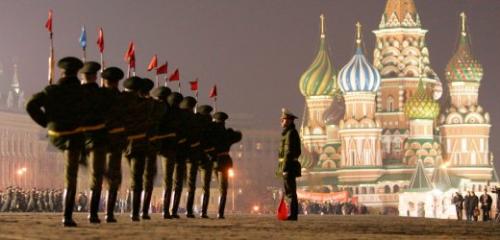 From Spiegel: NATO, in its current form, is not up to these tasks. In the future, the alliance should see itself as a strategic framework for the three centers of power: North America, Europe and Russia. This trio has common interests that are threatened by the same challenges, and which require the same responses. If the alliance intends to be the primary forum for addressing all crises — because it is the only forum where North America, Europe and Russia sit at the same table — then it must now establish the requisite institutional framework for that to happen. The door to NATO membership should be opened for Russia. Russia, in turn, must be prepared to accept the rights and obligations of a NATO member, of an equal among equals…
From Spiegel: NATO, in its current form, is not up to these tasks. In the future, the alliance should see itself as a strategic framework for the three centers of power: North America, Europe and Russia. This trio has common interests that are threatened by the same challenges, and which require the same responses. If the alliance intends to be the primary forum for addressing all crises — because it is the only forum where North America, Europe and Russia sit at the same table — then it must now establish the requisite institutional framework for that to happen. The door to NATO membership should be opened for Russia. Russia, in turn, must be prepared to accept the rights and obligations of a NATO member, of an equal among equals…
The trio comprising North America, Europe and Russia has an objective interest in surviving the consequences of the global economic crisis, thwarting the development of new power centers at the expense of old structures, facing challenges in the southern crisis region and cooperating in the Arctic. Nevertheless, there will be resistance to Russian NATO membership.
For this reason, in its internal debate with Eastern European skeptics, NATO must make it clear what the alliance stands to gain if Russia is gradually brought on board as a full member. It will be in the interest of both sides to define concrete interim steps. This could include the NATO countries and Russia issuing a joint declaration, at the beginning of the accession process, to use none of their weapons against each other, and that their nuclear weapons serve only one purpose: to prevent the use of nuclear weapons. On this basis, all Russian tactical nuclear weapons could be withdrawn to central storage facilities, where they would be subject to international monitoring at all times, in return for the withdrawal of American nuclear weapons from Europe. And a joint missile defense system could be installed to protect the territory of NATO countries and Russia.
Excerpts from letter by former German officials Volker Rühe, Klaus Naumann, Frank Elbe and Ulrich Weisser. (photo: Reuters)
Image: reuters_3_8_10.jpg
